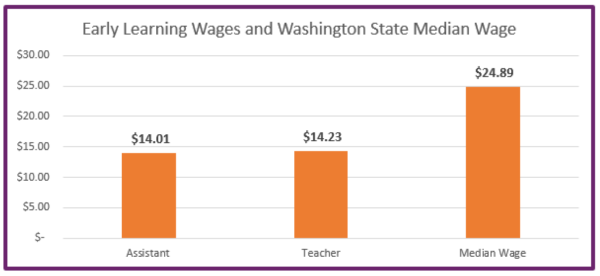Early Learning is critical to child development, family wellbeing, and community economic prosperity. Washington State has invested in building a supervisory and incentive structure for early learning through Early Achievers, including the Quality Rating and Improvement System.[1] However, wages for early learning teachers and caregivers hover near or in poverty.
The failure to remedy wage impoverishment undermines the Legislature’s finding that “child care is a sector that is critical to the vitality and economic security of our state and communities and families.”[2] Indeed, the Legislature itself has found that “child care providers are unable to recruit and retain a qualified workforce; that wages in the industry remain among the lowest of all professions, at or near minimum wage; and that the relationship between a child and a qualified caregiver is of paramount importance.”[3]
The failure to fully compensate early learning teachers and caregivers reinforces and further embeds racial inequity and gender discrimination. Women make up 89% of the early learning workforce, which is also disproportionately composed of Latinas and people of color.[4] Poverty level compensation violates the State of Washington’s intent to build the “organizational capacity to advance racial equity.”[5]

Sources: Employment Security Department, State of Washington, Median and Hourly Wages: https://www.esd.wa.gov/labormarketinfo/median-hourly-wages; State of Washington Department of Early Learning 2018 Child Care Market Rate Survey Final Report and earlier reports: https://www.dcyf.wa.gov/sites/default/files/pdf/reports/2018_Washington_State_Market_Rate_Survey.pdf
Low compensation negatively impacts quality of care, the well-being of our children, and the parents reliant on child care for work and their own education, and especially those parents who are child care teachers themselves. It encourages high rates of turnover and discourages early learning teachers from investing in education and career advancement. If we are sincere in establishing high quality early learning, we must advance compensation for the early learning workforce.
In 2018, the legislature commissioned a task force to research early learning compensation and develop recommendations.[6] The task force has recommended a compensation model which combines compensation referencing kindergarten teacher compensation and the state’s general salary scale for early learning program specialists. Lead teachers would be compensated between $42,000 and $58,000, depending on education, experience, and responsibility. This compensation model would require $800 million in new funding annually.[7]
We realize that such funding is unlikely in 2020. However, we also believe that the Legislature must make a down payment on compensation for early learning teachers and caregivers. Thanks to the Legislature’s foresight in 2005, we do have a law, RCW 43.216.675, as well as a practice of administration and implementation, to immediately address compensation.
Second Substitute House Bill 1344, as signed into law on May 13, 2019, states “…while the system awaits systemic change, the legislature finds that steps must be taken to …. stabilize the child care industry, and reduce turnover in the workforce.” (SSHB 1344, Section 1 (4)).
To meet the letter and spirit of 2SHB 1344, the Legislature can fund RCW 43.216.675 which is the state law passed by the Legislature in 2005 (SHB 1636, sponsored by Representative Eric Pettigrew). A budget proviso should provide these details:
All licensed childcare facilities, including child care centers, family home providers, and ECEAP and Head Start providers, shall be eligible for funding through RCW 43.216.675. Wage increments may be gained through educational advancement (inclusive of high school degrees and GED certification), years of experience, and job responsibilities, as well as equivalencies thereof as determined by the Department of Children, Youth, and Families. The wage ladder design must be consistent with Recommendation A-1 of the Washington State Legislature Compensation Technical Workgroup Report from April 2019: “The salary scale builds on existing law (RCW 43.216.675) and ensures the availability of funding statewide for centers and homes.”
The Department of Children, Youth and Families may additionally assist childcare facilities that are which have adopted the career ladder, with wage increments for childcare workers who gain additional work experience or work responsibility. The Department of Children, Youth and Families will consult with the Washington Childcare Centers Association, SEIU Local 925, Child Care Aware of Washington, and the Economic Opportunity Institute in implementing the career and wage ladder.
A $10 million budget proviso will fund wage enhancements for 7,500 workers, starting January 1, 2021. This cohort composes 25% of the early childhood education workforce in Washington.[8]
Footnotes:
[1] https://del.wa.gov/earlyachievers
[2] http://lawfilesext.leg.wa.gov/biennium/2019-20/Pdf/Bills/House%20Passed%20Legislature/1344-S2.PL.pdf, Second Substitute House Bill 1344, Section 1 (1)
[3] http://lawfilesext.leg.wa.gov/biennium/2019-20/Pdf/Bills/House%20Passed%20Legislature/1344-S2.PL.pdf, Second Substitute House Bill 1344, Section 1 (3)
[4] Sources: Total count for workers in Washington, 2017 4th Quarter: QWI Explorer: https://qwiexplorer.ces.census.gov/static/explore.html#x=0&g=0; Total count of early learning workers, NAISC Code: 6244 Child Day Care Services
[5] Racial Equity Initiative Data Report 2017, Washington State Department of Early Learning, P.1 https://www.dcyf.wa.gov/sites/default/files/pdf/reports/Equity_Initiative_Data_Report_1.18.2017.pdf
[6] http://leap.leg.wa.gov/leap/budget/lbns/171Omni5883-S.SL.pdf Section 615, p. 263
[7] https://www.dcyf.wa.gov/sites/default/files/pdf/reports/CompensationTechWrkgrpRprt.pdf p. 12-14 (PDF p. 14-16) Report to the Washington State Legislature COMPENSATION TECHNICAL WORKGROUP, April 2019
[8] See MERIT: https://www.dcyf.wa.gov/sites/default/files/pdf/reports/CompensationTechWrkgrpRprt.pdf p. 4 (PDF p. 6)
More To Read
August 19, 2022
The Child Care Emotional Roller Coaster
Decades of underfunding has left the child care sector on the brink of collapse
February 11, 2022
Washington’s Child Care Workers Deserve Better—Starting With More Paid Sick Time
As we head into year three of the pandemic, investments in the child care workforce are much-needed and long overdue
November 19, 2021
Build Back Better Passes the House
We're one step closer to a historic and necessary investment in working families
